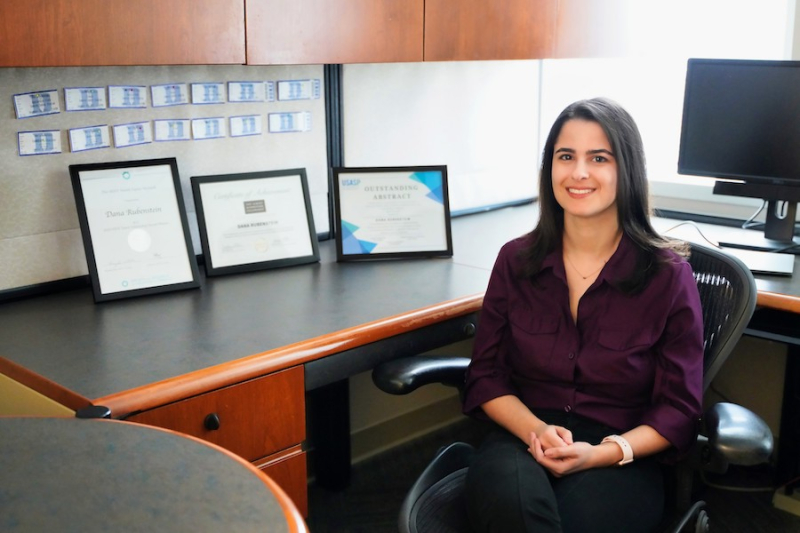
Dana Rubenstein entered the Duke CTSA TL1 Pre-Doctoral Training Program with an interest in health equity and tobacco use research. Since joining the program, Rubenstein’s research interests have broadened to include tobacco and cannabis use in chronic pain patients, earning her accolades and publications in major clinical research journals.
Rubenstein began her research career during her undergraduate years at Brown University, where she focused on public health and Latin American and Caribbean studies and helped conduct tobacco research. Her thesis focused on a clinical trial on predictors of smoking reduction among African American and Latinx people who smoke e-cigarettes.
“I liked the research process and discovered that I wanted to work more in behavioral health,” Rubenstein said. “I wanted to make a difference in people’s health by helping them change their behavior.”
Rubenstein enrolled at the Duke University School of Medicine in 2020, eager to expand her skillset as a clinical researcher and focus more on health equity. Soon after, she was accepted as a TL1 scholar with Joseph McClernon, PhD, CTSI associate director and professor of psychiatry and behavioral sciences, as her mentor.
Rubenstein and McClernon have collaborated on research focused on the association between pain and tobacco and cannabis use. Their study analyzed data from more than 32,000 adults and showed those who reported moderate to severe pain in the past week were twice as likely to use tobacco and 1.5 times more likely to use cannabis. Results from this research were recently published in Addictive Behaviors.
“As I became more experienced through the TL1 program, I began to develop independence as a researcher,” Rubenstein said. “Since incorporating cannabis use and pain into our research, I’ve been able to draw in researchers from all over the country and put together teams for projects to support those interests.”
“Dana’s productivity is impressive,” McClernon said. “But it goes beyond personal productivity; she’s a scholar who makes everyone around her that much better. She’s incredibly skilled at forming and energizing collaborations with investigators here at Duke but also from around the country including at Wake Forest, Brown, and the University of Minnesota.”
One of the benefits of the TL1 program is the dedicated time scholars can devote to not only research projects, but also additional skills that can positively impact clinical careers. In addition to McClernon’s mentorship, Rubenstein also credits TL1 mentors David Edelman, MD, and Steven Grambow, PhD, as contributing to her scientific development and improved statistical analysis skills.
As a medical student, Dana co-founded Healthcare Students with Disability and Chronic Illness (HSDCI), an affinity group for medical students and other health professional students to find community, support, resources, and advocacy.
Building off McClernon’s work, Rubenstein has expanded her focus of this research to include older adults and people with mental health conditions and disabilities. In addition to the recent publication, Rubenstein has also received several awards during her time as a TL1 scholar, most recently the American Public Health Association Disability Section Student Award for work leading to a career in disability research and public health.
“Without the TL1 program, I wouldn’t have had the time or resources that have allowed me to be as productive as I have been,” Rubenstein said. “Having the time and space to learn, do my research, and make connections has enabled me to accomplish far more than I could have anticipated, and strengthened my resolve to pursue clinical research.”